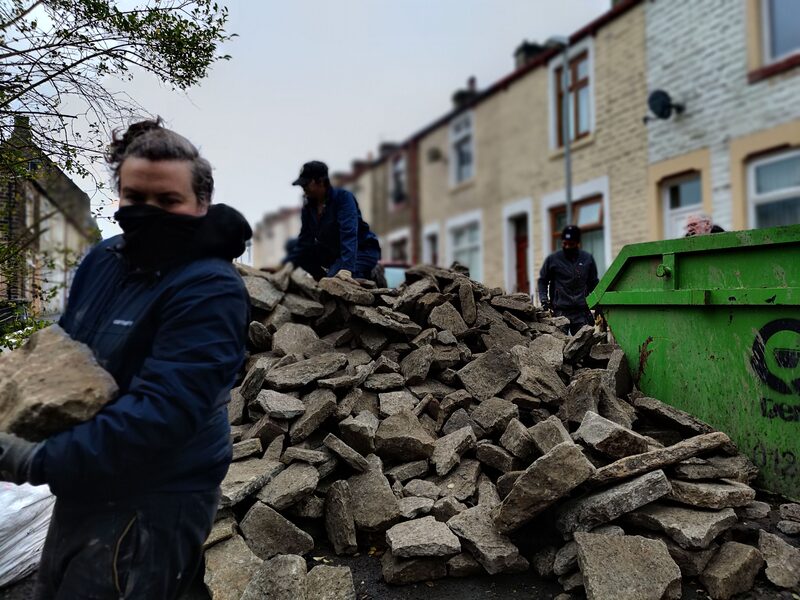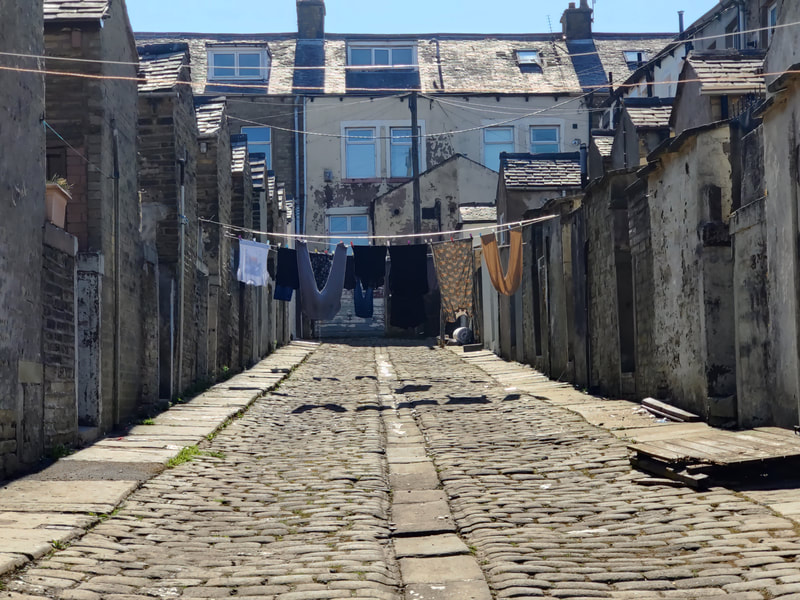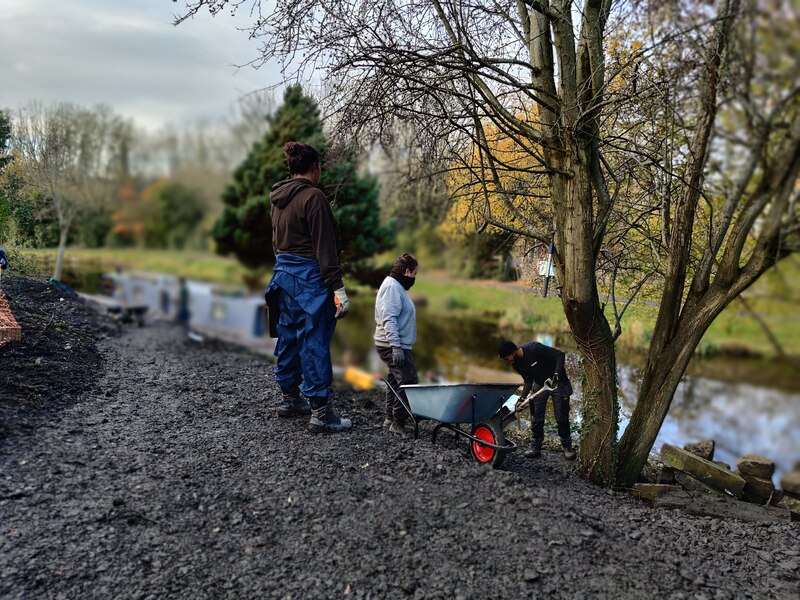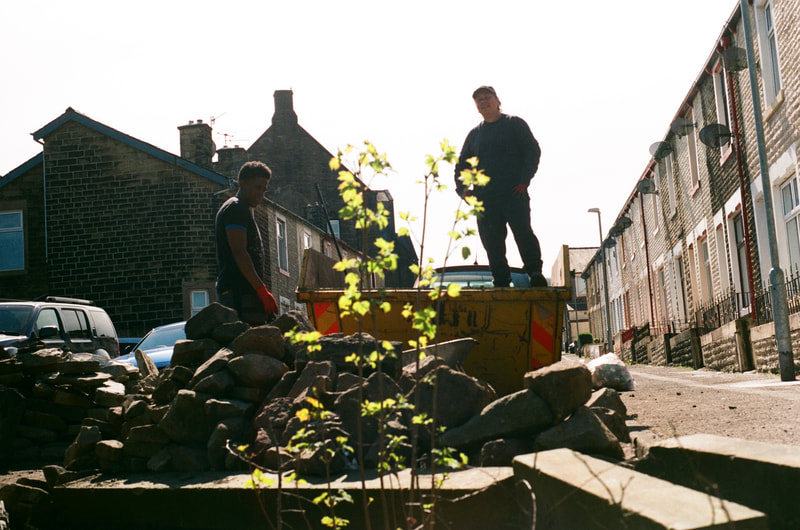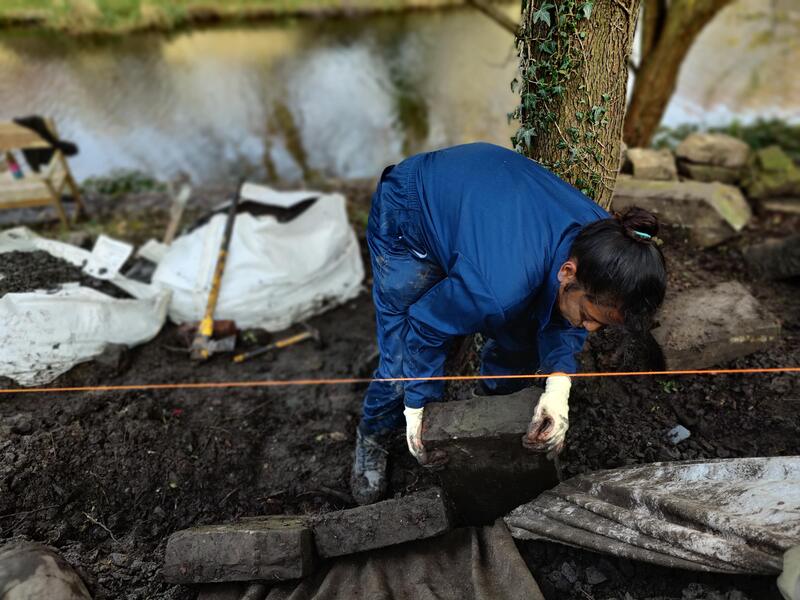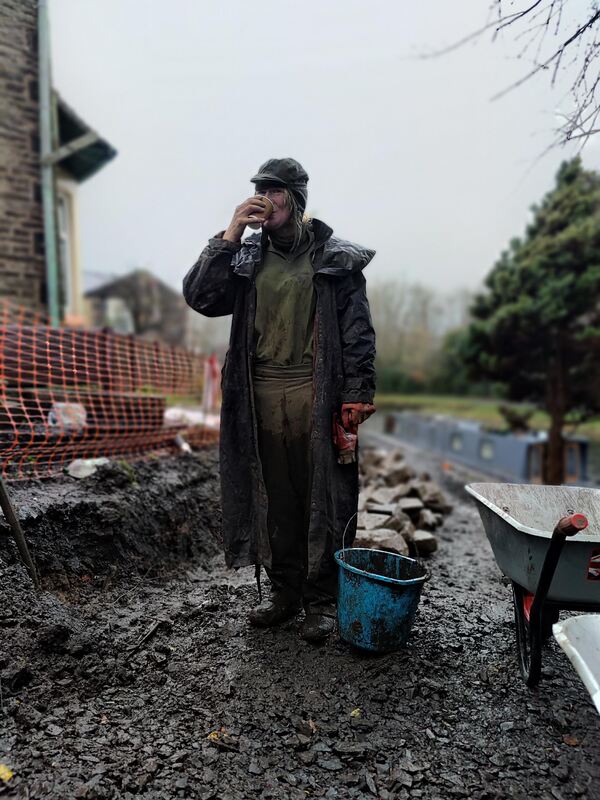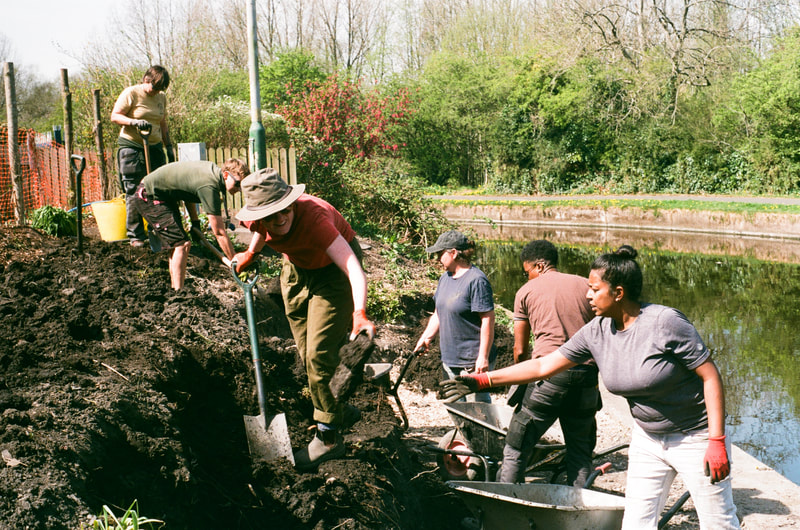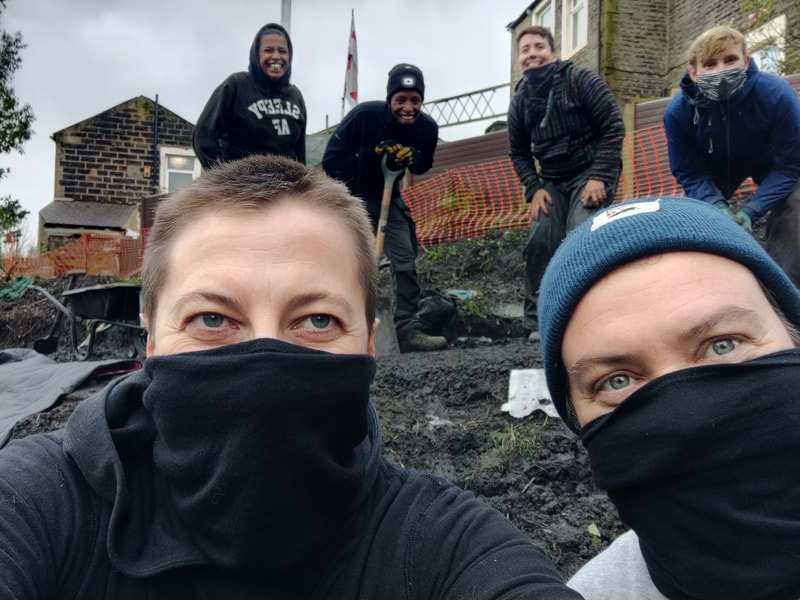Physic Garden
The Physic Garden is a co-created artists' garden, she nestles between a terraced street and Leeds to Liverpool Canal. Her creation has been entirely relational, she belongs to many. She is a response to crisis and an act of hope. Sitting beneath the shadow of Pendle Hill, her materiality references the Enclosure Acts - the restructuring of society. She stretches both backwards and forwards in time.
Every plant in the Physic Garden is medicinal. She is co-owned by Idle Women and Humraaz and was landscaped throughout the pandemic by a phenomenal team. We said that it would take seven years to build and that it would last for a hundred years. We have worked intimately for six. We know every stone, every grain of soil, every changing leaf.
The Physic Garden has been enabled by the support of many through a crowdfund and sisterhood campaign that raised votes in the ITV and National Lottery Peoples Project and with funding and support from The National Lottery Fund, Arts Council England, and SHED.
Every plant in the Physic Garden is medicinal. She is co-owned by Idle Women and Humraaz and was landscaped throughout the pandemic by a phenomenal team. We said that it would take seven years to build and that it would last for a hundred years. We have worked intimately for six. We know every stone, every grain of soil, every changing leaf.
The Physic Garden has been enabled by the support of many through a crowdfund and sisterhood campaign that raised votes in the ITV and National Lottery Peoples Project and with funding and support from The National Lottery Fund, Arts Council England, and SHED.
2024 Opening Celebration
14:00–22:00 BST, Friday 14 June 2024
The long-awaited public opening of the Physic Garden takes place this summer. The day begins with previews of the Physic Garden on Hargreaves Street, followed by light refreshments and performances by Eternal Taal – the UK’s first female Bhangra group – at Haworth Art Gallery on Hollins Lane, and then a women's dance and dinner, with music from Eternal Taal, lasting into the night.
Join us to celebrate and thank the many women who have made this garden possible. There will be good food, good music, plants and dancing!
The long-awaited public opening of the Physic Garden takes place this summer. The day begins with previews of the Physic Garden on Hargreaves Street, followed by light refreshments and performances by Eternal Taal – the UK’s first female Bhangra group – at Haworth Art Gallery on Hollins Lane, and then a women's dance and dinner, with music from Eternal Taal, lasting into the night.
Join us to celebrate and thank the many women who have made this garden possible. There will be good food, good music, plants and dancing!
2020 – 2024 Construction
Our plan had been to produce the hard landscaping of the garden in the way many art productions take place: quickly and efficiently with compartmentalised roles and expertise, weaving in embedded workshops and volunteering days to make sure all women could put their hands on it. But then Covid. We sat under the hawthorn tree and asked ourselves what was more important: to build the garden with women or to build a garden for women to recover in? We decided to let go of everything we knew and to begin instead by hand. One stone at a time.
We worked together, behind the scenes, creatively making decisions that we want to last for one hundred years. Though they weren't with us, this process called to mind the women we love. We imagined them in the garden as it took shape, feeling humbled to work outside so freely when so many were stuck inside. We experienced the joy of getting to know each other in a way that is unique to the emersion of creative collaboration. Some days, we were collectively in grief: the rage we felt wasn't specific to this pandemic but rather at how it amplified global inequalities. We wanted this garden to be more than a garden.
As Samira said, we wanted 'the earth to remember us' so through every weather we laughed, cried and laboured, working one stone at a time.
We worked together, behind the scenes, creatively making decisions that we want to last for one hundred years. Though they weren't with us, this process called to mind the women we love. We imagined them in the garden as it took shape, feeling humbled to work outside so freely when so many were stuck inside. We experienced the joy of getting to know each other in a way that is unique to the emersion of creative collaboration. Some days, we were collectively in grief: the rage we felt wasn't specific to this pandemic but rather at how it amplified global inequalities. We wanted this garden to be more than a garden.
As Samira said, we wanted 'the earth to remember us' so through every weather we laughed, cried and laboured, working one stone at a time.
2021 A Garden, Networked
Crushed by a year of lockdowns and facing another of the same, the pandemic presented a blow to this project. Even in 2021, women were still not able to meet and cultivate the garden.
Like so many others we started to realise the necessity and possibilities of digital connections in this time and thankfully we had the privilege of Charmian Griffin leading our team and community with her creative expertise and kindness . Charmian established the Physic Garden Network: a group of 100 women connected via post, telephone, and online messaging that would support each other through the isolation that shaped this time. These women met online weekly, learned to germinate seeds, got to know each other and exchanged gifts from their growing spaces and foraging trips. The plants and relationships that should have been cultivated on that strip of land in Nelson instead grew dispersed across the country.
A website – Physic Garden Network – emerged like a young green shoot from a complex underground network of intertwining roots. It represents the Network's impulse to share the knowledge, creativity and understanding that they have grown together. Growing Knowledge is a section containing insightful and wonderfully rambling conversations about cultivating and using medicinal herbs and Full Moon Reflections is a ongoing series of artistic responses to the network and now the garden itself from artists like Jazmin Morris, Nabihah Iqbal, Rifke, Rosalie Schweiker, Seyi Adelekun, and Vera van de Seyp. The Physic Garden Network also holds Medicinal Plant Studies, a learning space devised with endobiogenic herbalist and teacher Elizabeth Mara Baughman.
Like so many others we started to realise the necessity and possibilities of digital connections in this time and thankfully we had the privilege of Charmian Griffin leading our team and community with her creative expertise and kindness . Charmian established the Physic Garden Network: a group of 100 women connected via post, telephone, and online messaging that would support each other through the isolation that shaped this time. These women met online weekly, learned to germinate seeds, got to know each other and exchanged gifts from their growing spaces and foraging trips. The plants and relationships that should have been cultivated on that strip of land in Nelson instead grew dispersed across the country.
A website – Physic Garden Network – emerged like a young green shoot from a complex underground network of intertwining roots. It represents the Network's impulse to share the knowledge, creativity and understanding that they have grown together. Growing Knowledge is a section containing insightful and wonderfully rambling conversations about cultivating and using medicinal herbs and Full Moon Reflections is a ongoing series of artistic responses to the network and now the garden itself from artists like Jazmin Morris, Nabihah Iqbal, Rifke, Rosalie Schweiker, Seyi Adelekun, and Vera van de Seyp. The Physic Garden Network also holds Medicinal Plant Studies, a learning space devised with endobiogenic herbalist and teacher Elizabeth Mara Baughman.
2020 Team
As the pandemic rolled out, a new community of women joined us, those whose work and plans had also evaporated.
Samira and Jaheda are musicians and work as freelance theatre technicians in lighting and costume. Anita is a master dry stone waller, we met her three years ago when she taught us at a women's walling workshop. Liz and Jai are She Digs, a recently established gardening duo.
Alys our plantswoman, one of the first women we asked to join us on this endeavour to make a physic garden, Charmian and the Idle Women sisterhood were in daily contact for perspective. Uzma a past Idle Women caretaker and Ellie a stage manger spent the Autumn with us. Then others came to the team for short specialist jobs like Gillian the tree surgeon, Cathy and Diane the electricians.
Samira and Jaheda are musicians and work as freelance theatre technicians in lighting and costume. Anita is a master dry stone waller, we met her three years ago when she taught us at a women's walling workshop. Liz and Jai are She Digs, a recently established gardening duo.
Alys our plantswoman, one of the first women we asked to join us on this endeavour to make a physic garden, Charmian and the Idle Women sisterhood were in daily contact for perspective. Uzma a past Idle Women caretaker and Ellie a stage manger spent the Autumn with us. Then others came to the team for short specialist jobs like Gillian the tree surgeon, Cathy and Diane the electricians.
2020 Observation
For a year we observed the garden.
The plan was for a programme of workshops for women led by a new gardener-in-residence and Guardian journalist Alys Fowler, based at Idle Women’s Medicine Nursery. This year of workshops and observation work was supported by the National Lottery Community Fund and Grow Wild, the national outreach learning initiative of the Royal Botanic Gardens, Kew. But 2020 presented us with new challenges and we were unable to bring together groups of women to learn and observe together in person.
Instead, that year, Idle Women founders Rachel Anderson and Cis O'Boyle witnessed the seasons and growing cycles, learn from the plants that flourished and disappeared in the garden, surrounding hedge-grows and between the cracks in the pavements and along the towpaths. This close and slow observation informed us about the soil, rainfall, drainage, shade and uninterrupted sun. It also informed us about ourselves.
The plan was for a programme of workshops for women led by a new gardener-in-residence and Guardian journalist Alys Fowler, based at Idle Women’s Medicine Nursery. This year of workshops and observation work was supported by the National Lottery Community Fund and Grow Wild, the national outreach learning initiative of the Royal Botanic Gardens, Kew. But 2020 presented us with new challenges and we were unable to bring together groups of women to learn and observe together in person.
Instead, that year, Idle Women founders Rachel Anderson and Cis O'Boyle witnessed the seasons and growing cycles, learn from the plants that flourished and disappeared in the garden, surrounding hedge-grows and between the cracks in the pavements and along the towpaths. This close and slow observation informed us about the soil, rainfall, drainage, shade and uninterrupted sun. It also informed us about ourselves.
2019 Herbalist in Residence
Funding from the Tampon Tax distributed by Community Foundation Lancashire supported a herbalist-in-residence programme at The Physic Garden in 2019. In the same year Idle Women welcomed women to over ninety free workshops, introducing plants, herbal practices, anatomy and physiology, and principles of basic health education.
2019 Campaigning for funds
A year after the crowdfunder in 2019 The National Lottery Community Fund invited us to apply to be part of the People's Project, a collaboration with ITV that broadcasts regional presentations of shortlisted projects for the public to vote for. Voting takes place over a week and those who win the most votes win £50,000.
We had a garden but not the funds to landscape it and with an award of that size we knew that we could carry out everything we hoped for so we took part in the campaign. Campaigning took us to local women's centres where we made nettle pesto together, the Idle Women Sisterhood was formed (and remains integral today) the sisterhood is a collection of women who stepped into the role of driving the campaigning, the whatsapp warriors and word of mouth specialists who organised social events and talks, the children on the streets surrounding the garden flyer'd the neighbourhood and remarkably we won the votes we needed.
£50,000 to landscape the garden.
We had a garden but not the funds to landscape it and with an award of that size we knew that we could carry out everything we hoped for so we took part in the campaign. Campaigning took us to local women's centres where we made nettle pesto together, the Idle Women Sisterhood was formed (and remains integral today) the sisterhood is a collection of women who stepped into the role of driving the campaigning, the whatsapp warriors and word of mouth specialists who organised social events and talks, the children on the streets surrounding the garden flyer'd the neighbourhood and remarkably we won the votes we needed.
£50,000 to landscape the garden.
2019 Buying Land in Trust
Owning the land is important to us.
Women own almost no land globally. They represent the majority of the labour but don't hold the power to make decisions about how to care for, protect and sustain it. Witch hunts are not historical, they are present and rising - increasingly they are instigated to remove land from women once they inherit land as a way of seizing back ownership The garden is equally owned by Idle Women and Humrraaz in trust to women Humraaz Support Services is led by and for Black and Minoritised Ethnic Women and supports women victims, survivors and their families affected by domestic abuse, sexual abuse and violence.
Women own almost no land globally. They represent the majority of the labour but don't hold the power to make decisions about how to care for, protect and sustain it. Witch hunts are not historical, they are present and rising - increasingly they are instigated to remove land from women once they inherit land as a way of seizing back ownership The garden is equally owned by Idle Women and Humrraaz in trust to women Humraaz Support Services is led by and for Black and Minoritised Ethnic Women and supports women victims, survivors and their families affected by domestic abuse, sexual abuse and violence.
2018 Crowdfunding
In 2018 in order to quickly raise the money to buy the land we did something we hadn't done before, a crowd funder. Many of the artists who joined us on the boat tour donated new work as rewards, women held yoga classes and events to support the campaign and over 200 people supported locally and nationally, it was really hard but we did it.
On 4th May 2018 we successfully raised £26,460 with 310 supporters in 49 days via Crowdfunder.
On 4th May 2018 we successfully raised £26,460 with 310 supporters in 49 days via Crowdfunder.
2017 Land for Sale
This story begins on our boat when a woman waved to us as we turned the corner at Lomeshaye wharf in Nelson Lancashire, it was 2015 and our arrival in Lancashire. The woman was in her canal side garden and we later got to know Sonia before she sold her house and moved away.
A year later we were walking along the towpath with some of the women from Humraaz refuge and one woman in her early twenties began to talk to us about her fears that she was having a heart attack, we talked it through and recognised her anxiety and panic attacks as a reasonable response to her then situation and reflected that in our own lifetimes we had learnt a great deal from other women about strategies and ways to help navigate the sometimes dreadful times.
As we toured the boat we had more peripheral conversations with women, about a lack of recognition from stretched health care providers, over prescribing, expensive branded inaccessible self-care, the lack of specialist health provision for women of colour, for lesbians for elder women.
All the time we were speaking frequently to Silvia Federici as we navigated the waters shadowed by Pendle Hill - the site of the Pendle witch hunts - Silvia sites the witch hunts and the enclosures of land and knowledge as the birth of capitalism and violence against women.
We were invited by a librarian - Suzanne to visit the medieval medicinal books at Cheatham's library. She showed us the books which form the foundations of our health system, that were hand written by monks and omitted women. The first herbal was published alongside two other pivotal texts which included the King James Bible and the Malleus Maleficarum - the witch hammer - a manual that gave instructions to hunt and kill women both still in print today.
Visiting these roots made sense of a systemic disconnection we often experience with our own health and bodies. Creating a physic garden with and for women is an act of reaching deeper, to the time before the violence when we imagine that we knew ourselves and the world around us on our own terms.
In 2017 we saw an advert on facebook about a garden mooring for sale - our boat was in the picture, we recognised Sonia's garden. We emailed the seller and told them we hoped to buy the garden but had to raise the money, that we would be using it to create a space primarily for women who has experienced violence. A woman replied and told us that she had once exited a violent marriage via refuge and that art had given her purpose and recovery, she wanted us to have the garden and would wait for us to raise the funds.
A year later we were walking along the towpath with some of the women from Humraaz refuge and one woman in her early twenties began to talk to us about her fears that she was having a heart attack, we talked it through and recognised her anxiety and panic attacks as a reasonable response to her then situation and reflected that in our own lifetimes we had learnt a great deal from other women about strategies and ways to help navigate the sometimes dreadful times.
As we toured the boat we had more peripheral conversations with women, about a lack of recognition from stretched health care providers, over prescribing, expensive branded inaccessible self-care, the lack of specialist health provision for women of colour, for lesbians for elder women.
All the time we were speaking frequently to Silvia Federici as we navigated the waters shadowed by Pendle Hill - the site of the Pendle witch hunts - Silvia sites the witch hunts and the enclosures of land and knowledge as the birth of capitalism and violence against women.
We were invited by a librarian - Suzanne to visit the medieval medicinal books at Cheatham's library. She showed us the books which form the foundations of our health system, that were hand written by monks and omitted women. The first herbal was published alongside two other pivotal texts which included the King James Bible and the Malleus Maleficarum - the witch hammer - a manual that gave instructions to hunt and kill women both still in print today.
Visiting these roots made sense of a systemic disconnection we often experience with our own health and bodies. Creating a physic garden with and for women is an act of reaching deeper, to the time before the violence when we imagine that we knew ourselves and the world around us on our own terms.
In 2017 we saw an advert on facebook about a garden mooring for sale - our boat was in the picture, we recognised Sonia's garden. We emailed the seller and told them we hoped to buy the garden but had to raise the money, that we would be using it to create a space primarily for women who has experienced violence. A woman replied and told us that she had once exited a violent marriage via refuge and that art had given her purpose and recovery, she wanted us to have the garden and would wait for us to raise the funds.


